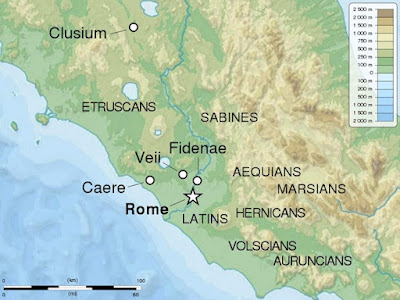Many posts have looked at the topic of numbers. More posts,
which will discuss numbers in greater detail, will be coming soon. As a way of
preparing for that, take a look at the word cloud. At first sight it seems
quite challenging! However, like the declension tables, you need to take it all
apart and see what is actually happening when numbers are formed.
There are six key points you need to know to be able to
handle numbers – all of them. Here’s a summary:
[1] 1 – 10
[2] vīgintī; centum; mīlle
[3] -decim
[4] ūnde- / duodē-
[5] -gintā
[6] -centī / -gentī
Point [1]
Almost every number in Latin is formed from the base numbers
1 – 10.
ūnus (1); duo (2); trēs (3); quattuor (4); quīnque (5); sex
(6); septem (7); octō (8); novem (9); decem (10)
Point [2]
The only numbers beyond that which are not formed from 1- 10
are: vīgintī (20), centum (100) and mīlle (1000)
So, what is it you need to know to be able to recognise
the numbers without getting dragged down by spelling changes and / or
declensions (because some numbers do decline)?
In the same way that English has thirteen and thirty
and three hundred, so too does Latin.
Point [3] teens: -decim (decim < decem [10])
The base number may change a little in its spelling but it’s
still recognisable:
ūnus > ūndecim (11)
sex > sedecim (16)
Point [4] duodē- / ūndē-
These can catch you out!
Take them apart:
duo (2) dē (from)
ūn (1) dē (from)
These two are used in compound numbers ending in 8
and 9 e.g. 28, 49 etc. with the next multiple to
come and are known as subtractive forms i.e. taking away from the next number
rather than adding to it which the other compound numbers do.
ūndecim (11); duodecim (12); tredecim (13); quattuordecim
(14); quīndecim (15); sēdecim (16); septendecim (17)
Now …
duo ¦ dē ¦ vīgintī = two from twenty =
18
ūndēvīgintī = one from twenty = 19
Point [5] Multiples of ten: -gintā
vīgintī (20) is the only multiple of ten that does
not end in -gintā and cannot be deduced from the numbers 1 - 10. La. vīgintī
> Fr, vingt; Sp. veinte; It. venti; Port. vinte.
Again, don’t be concerned by spelling changes; the base
number is still obvious.
trīgintā (30); quadrāgintā (40); quīnquāgintā
(50); sexāgintā (60); septuāgintā (70); octōgintā (80); nōnāgintā
(90)
Compound numbers are straightforward since they are
most often two (or more) parts of the number placed side-by-side. You may see
other ways of expressing the compounds but the meaning is always clear.
vīgintī ūnus (21); ūnus
et vīgintī (compare Gmn: einundzwanzig and older style English
one and twenty)
trīgintā duo (32); duo
et trīgintā
quadrāgintā sex
(46)
quīnquāgintā quīnque
(55)
septuāgintā trēs
(73)
octōgintā septem
(87)
nōnāgintā quattuor
(94)
Note again the compounds ending in 8 and 9:
duo ¦ dē ¦ septuāgintā [2 from 70] = 68
i.e. don’t ‘skim read’ the main number; look at what comes before it
ūndēnōnāgintā [1 from 90] = 89
Combinations like vīgintī novem and vīgintī octō are
also possible, but less common than the forms shown above.
Point [6] Multiples of 100: -centī / -gentī
Those endings have been formed from centum (100)
duo > ducentī (200)
quīnque > quīngentī (500)
sex > sēscentī (600)
novem > nongentī (900)
Take a good look at:
[2] -gintā: the marker for multiples of ten
[3] -gentī: a marker for the multiples of 100
Both have a /g/ and /nt/ and they can be misread, but the vowels
are different.
-gIntā
-gEntī (remember it comes from centum)
Match the numerals with the Latin numbers; there are three
base numbers in this exercise - trēs quīnque septem - and
so look for [i] the "markers" and [ii] duodē- / ūndē-
3; 5; 7; 13; 15; 17; 28; 30; 49; 50; 70; 300; 500; 700






























